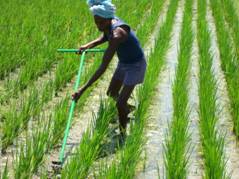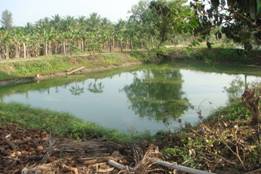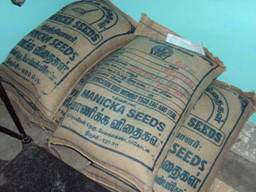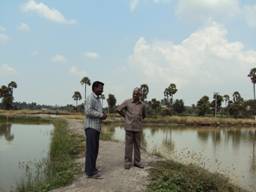 |
||||||||
|
||||||||
|
Crop Production |
Krishi Vigyan Kendra (KVK), Tiruchirappalli District | Weather |
||||||
Success Stories Cases of large scale adoption 1. Direct sown paddy through Drum seeder
2. Alternate crops Similarly maize hybrid COH ( M) 5 as alternate crops was demonstrated as FLD during 2006 -07, in rainfed black soils of Siruganur area of Mannachanallur taluk. Based upon the success and higher net profit, TNAU maize hybrid has spread in more than 50 acres in Mannchanallur taluk. To scale up the area under maize a farmers Field School on IPM in Maize is under progress. 3. SRI Technolgy in Paddy cultivation The System of Rice Intensification ( SRI) technology is a new rice cultivation practice with reduced water requirement and higher productivity of more than 20%. The major technologies contemplated in this system are : Based upon the trainings and method demonstrations organised by this KVK on SRI Technology from 2005 -06 , more than 90 ha in Lalgudi, Manikandam and Mannachanallur blocks of Trichy districts were under SRI especially during kharif season and the farmers are convinced about the advantages of SRI method of rice cultivation. 4. Inland aquaculture As a followup, based upon our proposal, two more training on “Intensive Aquaculture” has been sanctioned with a budget outlay of Rs. 1.5 lakhs. 5. Reclamation of alkali soil with distillery spent wash The use of distillery spent wash (DSW- Industrial effluent from alcohol industry with acidic pH 3.8 – 4.0) for reclamation of alkali soil was demonstrated to farmers of Manikandam block in an off campus training. Based upon that about 25 farmers have used distillery spent wash for reclamation of alkali soils during May,2007. The technologies prescribed are :
The reclamation of alkali soil with DSW have doubled the rice yields from 2.5 t /ha to 5.0 t /ha . This technology is applicable in a radius of 25 km from distillery units of Tamil Nadu. This technology paved the way for eco friendly disposal of distillery spent wash as a substitute for gypsum for the reclamation of alkali soils. Cultivator Turned Mega Seed Distributor The institutional agencies of the Govt. could satisfy around twenty per cent of the seed requirement. The remaining seed requirement is fulfilled by the farmers’ own seeds. The predominant factor which determines the productivity of rice is purity of seeds. The government of India, through a centrally sponsored scheme “Strengthening of Quality Seed Production in coarse grain crops” supported KVK for equipping the farmer of Tiruchirappalli District during 2006-2008. KVK took up the venture and the concept was ‘Developing Seed Villages’ in Rice, Pulses and Oilseeds. The intervention of KVK included identification of nine villages for rice, six villages for blackgram and four villages for sesame. In each village clusters, 50 farmers were selected and supplied with either foundation seeds or certified seeds for an acre at 50 per cent subsidized cost. This is the first stage of intervention made by KVK and around 11 tonnes of paddy seeds of varieties ADT 43, ADT 36, ADT 45, ADT 39, CO 49, White ponni and BPT 5204 in Kharif and Rabi seasons of 2006-2007 and 2007-2008, were supplied. As the second intervention, the selected farmers from seed clusters were trained on seed production techniques at three stages of crop growth viz., raising nursery planting and at harvest. The technologies such as seed treatment, rogueing harvesting at physiological maturity, processing and storage were demonstrated by the scientists of KVK at various stages and the farmers were equipped in Quality Seed Production. KVK identified the village ‘Tirumangalam’ of Lalgudi Taluk where Th.N. Rajagopal was one of the beneficiaries among the fifty farmers selected in Tirumangalam cluster. Initially 24 kg of BPT 5204 known as ‘Andhra Ponni’ locally and 24 kg of Co 43 seeds were supplied to him along with other farmers. He was trained on seed production techniques as stated above. Because of the involvement and innovation made by KVK, he has sown these seeds in two acres from which he harvested 2000kg of BPT.5204 seeds and 1900 kg of Co43 seeds. Then he distributed these seeds to around 900 farmers for raising BPT.5204 under SRI method of cultivation. Similarly with 1900 kg of Co 43 seeds, he supplied seeds to around 750 farmers at the rate of 2 kg per acre under SRI method and the remaining quantity of BPT.5204 to 10 farmers and Co43 to 20 farmers under conventional method of cultivation. With just 24 kg each of BPT 5204 and Co43 seeds supplied by KVK, Mr. N.Rajagopal could make tremendous efforts in multiplying the seeds to cover an area of 1650 acres of BPT 5204 and Co43 under SRI throughout the District and 30 acres under conventional cultivation. Th. Rajagopal not only supplied the quality seeds to around 1680 farmers, but also trained them in his farm to produce quality seeds from the seeds supplied by him. He advised all the farmers to raise the crops as per the seed certification standards with the help of the officials of the Department of Seed Certification and KVK. Hence, through the KVK’s intervention of identifying the approximate seed cluster andmotivating a cultivator like Th. Rajagopal of Tirumangalam, the lateral spread of the availability of quality seeds of rice Th. Rajagopal apart from producing quality seeds, has established the seed processing unitat a cost of 40 lakhs rupees in the neighbouring ‘Nagar’ village on a collaborative manner with other progressive seed producers. Leading Fish and Fingerlings producer in Trichy District In India, the production from inland aquaculture has gone up to 3.3 million tonnes of which 85 per cent is contributed by carps, cat fish and prawn are the important component of culture practices in the economy. In Tiruchirappalli District of Tamil Nadu which is 100 km away from the sea shore, Inland Aquaculture with Indian carps is practised only in smaller scale by a few farmers though it is economically sound technology with heavy demand for fish in the market. Hence an attempt was made by this KVK to create awareness among the farmer about inland aquaculture which can be taken up in farm ponds or public tanks. Growing 6 acres of Sugarcane var.COC 86032 and supplying to the nearby Kothari Suga He has purchased 1.5 acres of adjoining lands from the profit he earned through aquaculture in two years and the entire success story was documented and telecasted thro’ Doordarshan arranged by this KVK. Moreover, he used to share his experiences to the budding exntrepreneurs, in the Inland Aquaculture Training programmes organized by the KVK. Serving as a member of Tamil Nadu State Aquaculturists Forum, he gives many innovative ideas for the policy makers to make the Inland Aquaculture lucrative in future. |
||||||||
Special Technologies |
||||||||
 |
||||||||
Home | About Us | Success Stories | Farmers' Association | Farmers' Innovation | Publications | FAQs | Contact
© 2013 TNAU. All Rights Reserved. |
||||||||
 The labour scarcity for transplanting led to use of drum seeders for direct sown paddy in Trichy district. The farmers shown greater interest in adopting direct paddy seeding technology due to shortage of labourers during peak season. The 8 row paddy seeder developed by TNAU was demonstrated in E. vellanur of Lalgudi taluk for direct sowing paddy in 25 acres in kharif season of 2006-07. Based upon their experiences, the farmers have themselves fabricated 5 numbers of paddy drum seeder replica of TNAU model in local workshop for their own use. Based upon the success, farmers from nearby villages have purchased five drum seeder from TNAU, Coimbatore for their use. The direct sown paddy through drum seeder has attracted all categories of farmers due to easy operation, less weight, line sowing with less seed rate ( 8 kg / acre) more tillers, early maturity etc., apart from savings in transplanting cost. The line sowing of paddy has also helped the farmers to utilise cono weeder for weeding. The drum seeder available at KVK is also used by farmers of Jeeyapuram, Nagar and other parts of Tiruchirappalli districts.
The labour scarcity for transplanting led to use of drum seeders for direct sown paddy in Trichy district. The farmers shown greater interest in adopting direct paddy seeding technology due to shortage of labourers during peak season. The 8 row paddy seeder developed by TNAU was demonstrated in E. vellanur of Lalgudi taluk for direct sowing paddy in 25 acres in kharif season of 2006-07. Based upon their experiences, the farmers have themselves fabricated 5 numbers of paddy drum seeder replica of TNAU model in local workshop for their own use. Based upon the success, farmers from nearby villages have purchased five drum seeder from TNAU, Coimbatore for their use. The direct sown paddy through drum seeder has attracted all categories of farmers due to easy operation, less weight, line sowing with less seed rate ( 8 kg / acre) more tillers, early maturity etc., apart from savings in transplanting cost. The line sowing of paddy has also helped the farmers to utilise cono weeder for weeding. The drum seeder available at KVK is also used by farmers of Jeeyapuram, Nagar and other parts of Tiruchirappalli districts.  Based upon the trainings and field visit organised by this KVK during May- July 2007 with sponsorship from NFDB, Hyderabad about 124 farmers and 54 extension functionaries were trained on inland aquaculture as component of Integrated farming system. Based upon the trainings KVK could inventorise successful practicing farmers of inland aquaculture viz., Mr. Sivarajan, Nerkuppai, Mr. Thandapani, Asoor, Mr. Fedrick Nicson, Mettupatti and another 5 more farmers. As a follow up of the training Mr. S.K.Selvanathan of Melaperungavoor had started in land aquaculture in one acre pond.
Based upon the trainings and field visit organised by this KVK during May- July 2007 with sponsorship from NFDB, Hyderabad about 124 farmers and 54 extension functionaries were trained on inland aquaculture as component of Integrated farming system. Based upon the trainings KVK could inventorise successful practicing farmers of inland aquaculture viz., Mr. Sivarajan, Nerkuppai, Mr. Thandapani, Asoor, Mr. Fedrick Nicson, Mettupatti and another 5 more farmers. As a follow up of the training Mr. S.K.Selvanathan of Melaperungavoor had started in land aquaculture in one acre pond.  hasincreased from 2 acres to 1680 acres in the subsequent season and then to 50,625 acres. The value of the seeds ,thus produced is 15.19 million rupees.
hasincreased from 2 acres to 1680 acres in the subsequent season and then to 50,625 acres. The value of the seeds ,thus produced is 15.19 million rupees.  rs was the main occupation for Th.Nickson and his father. After attending a training programme and further exposure to Inland Aquaculture activities by this KVK through National Fisheries Development Board’s funding support to this KVK, Th.Nickson has grown as an Fisheries Expert owning around 3 acres of Fish ponds in Metupatty village, 6 KM away from Lalgudi. As there was a great demand from the public for fresh carps (Catla, Rohu and Mirgal), he got regular income through this new enterprise. Maintaining nursery ponds and supplying fingerlings to the fellow aquaculturists, rearing fish of composite culture and selling at spot, evaluating different low cost feed for fish, using Panchkavvya even for fish are some of his innovative ideas which had given him much results.
rs was the main occupation for Th.Nickson and his father. After attending a training programme and further exposure to Inland Aquaculture activities by this KVK through National Fisheries Development Board’s funding support to this KVK, Th.Nickson has grown as an Fisheries Expert owning around 3 acres of Fish ponds in Metupatty village, 6 KM away from Lalgudi. As there was a great demand from the public for fresh carps (Catla, Rohu and Mirgal), he got regular income through this new enterprise. Maintaining nursery ponds and supplying fingerlings to the fellow aquaculturists, rearing fish of composite culture and selling at spot, evaluating different low cost feed for fish, using Panchkavvya even for fish are some of his innovative ideas which had given him much results.